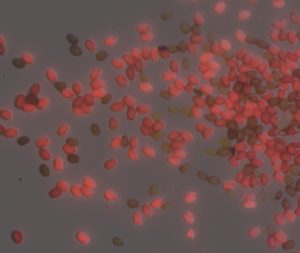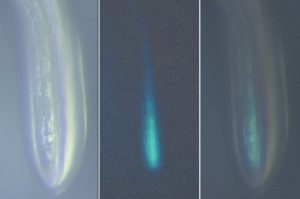
Max Bush, Research Assistant in the Sablowski Lab at the John Innes Centre, explains how the CoolLED pE-300white is helping them understand genetic mechanisms in plant development, opening the way to controlling plant growth and increasing crop performance in a changing climate.
Improvement in crop yields for the increasing human population will be necessary to compensate for the sub-optimal growth conditions of an increasingly dynamic climate. Understanding how model plants such as Arabidopsis adapt to a changing environment, will help in breeding more productive crops that tolerate a wide range of climates. Crop yield depends largely on stem height and the architecture of the region bearing flowers and grains. The stem grows at its proliferative tip called the shoot apical meristem (SAM). Boundary domains of restricted growth within the SAM define the borders of newly forming organs e.g. flowers that become grains. We work on the genetics and cell biology of meristem and stem development in Arabidopsis and in related crop species (Brassica). The interests of the Sablowski lab include:
How the stem is initiated
How stems originate is a major gap in our understanding of plant development. During Arabidopsis stem initiation, the SAM regulatory gene REPLUMLESS controls 3D patterns of cell division and growth through repression of boundary genes.1
Understanding how stem development is regulated
DELLA mutants with greatly improved crop yield were developed during the ‘green revolution’. DELLA proteins have genetically separable roles in controlling stem growth and the size of the SAM and could unlock further yield gains.2 We are using mathematical models and confocal microscopy to understand how SAM cells actively maintain a target size, but are released from this constraint as individual organs grow.3
Finding novel genes involved in stem development
We identified candidate genes involved in stem architecture using GWAS and use CRISPR-cas9 gene-editing to study the effect of mutated alleles in stem growth. One such gene is involved in stem vasculature development. Some IQD genes are regulated by transcription factors important for stem growth. IQD gene mis-expression in tomato and rice plants exhibit altered fruit shape, indicating they could be useful for modifying key agronomic traits. We are investigating the effect of altered IQD gene expression in the SAM on plant growth.
How regulatory genes coordinate cell division and cell growth at the SAM
ATH1 is a key regulator of stem growth and acts as a “gatekeeper” for hormone signalling that promotes stem growth. By investigating ATH1 regulatory sequences, useful data may be found to create new variation in crops. The coordinated growth of boundary domains relies on a tight control of local gene transcription and inter-regional hormone signalling. Understanding how boundary genes and hormone signalling control stem growth could increase plant productivity by modifying plant height and shape.
Screening for genetically transformed seeds with CoolLED pE-300white Illumination System

We use our CoolLED Illumination System to screen for our CRISPR-cas9 TDNA that incorporates a DsRed-tagged seed coat gene; fluorescence confirms the presence of TDNA allowing selection of transformed seeds. In the next generation, we want non-fluorescing brown seeds bearing only the genetic mutation of interest.

We also use the Illumination System to screen seedlings that are segregating for reporter genes (see root tip image).
Ultimately, we aim to reveal fundamental principles of plant development to allow modification of plant growth and increase crop performance. We hope to reveal the genetic mechanisms controlling stem initiation and produce novel genetic tools to control the height and shape of plants.
References
- Bencivenga et al. (2016). Developmental Cell 39, 198-208.
- Serrano-Mislata et al. (2017). Nature Plants 3, 749-754.
- Serrano-Mislata et al. (2015). Current Biology 25, 2991-2996.
